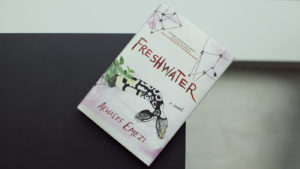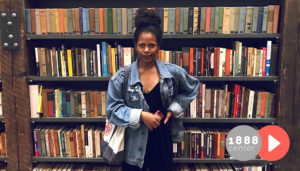I have just finished reading Akwaeke Emezi’s powerful debut, Freshwater. Its premise – a novel-length story of an ọgbanje child and its/her/their* experience of the human and spirit world – was one we had needed for a long time since Chinua Achebe gave us the character Ezinma in Things Fall Apart, described as ọgbanje because she was the first of ten children that did not die at birth. In Yorùbá, they are called àbíkú children, and have been subjects of many works of poetry and fiction. Having such a contemporary story based on the real-life story of someone we know makes it doubly intriguing for a novel, with potentials and pitfalls.
This novel, which takes place this time in the modern era of emails, tennis courts, airplanes, condoms, and surgeries, tells the story of an ọgbanje child called the egg of the python: akwa-eke (also ‘the Ada’ – first girl child; also ‘the child of Ala’), whose life begins to get interesting after a night of trauma releases to her reality many spirits she had carried with her since birth. “Interesting” is a curious word to use to describe what happens, but only because the writing successfully immerses the reader in the trauma of her circumstances while simultaneously offering some measure of distance through a multiplicity of voices, all belonging to different entities through which the spirits that control her body chose to express their personalities. Their primary aim is to destroy the body and pull her spirit back to where they came from, but failing that, settling to ‘protect’ her through a series of attack and defense mechanisms that turn the life of such a carrier into one of wild and tumultuous adventure.
“When we were first placed inside her, with these humans, the odds were that the Ada would survive. It was, in retrospect, a very low bar to set. She did not die, yes, but she was not guarded, she was violated, so far as we were concerned, they failed. This is why we have never regretted stepping in, whether as ourself or the beastself. Show us someone, anyone, who could have saved her better.” (Kindle LOC 2411)
I have never read any other book like it. Not in the way the author introduces us to the many characters that live within one person. Not in the way she carries us along with her on a rollercoaster of spiritual and physical experiences that would have been hard to describe in any other way. Not many novels exist in which there are so many characters, but few people. It is a testament to the author’s gift and talent that we are never confused at each turn.
What makes the book important, however, is not just the fact of its existence, its impressive narrative style which combines Nigerian pidgin lingo, Igbo, and standard English, and the intimate exploration of what being an ọgbanje means in a modern time. A month before the book was released, the author penned a complementary essay in The Cut in which she describes her transition across realities, from woman to “a spirit customizing its vessel to reflect its nature.” She was not just becoming non-woman by removing the body part that reminded her every month of the nature of which body it inhabited, she was also freeing herself from the prison of categorization: a transition that isn’t from one gender to the other, but from body to spirit. Serving as complementary features the way that Binyavanga Wainaina’s essay I am a Homosexual, Mom complements his memoir One Day I Will Write About This Place like a lost final chapter, Emezi’s essay fits the novel like a necessary coda, bringing an important conversation to the fore about how transitioning and attendant medical procedures aren’t really such an ‘unAfrican’ phenomenon after all, but had only been spoken of in that light because we had suppressed the voices that could otherwise explain to us the things we knew all along.
“The first madness was that we were born, that they stuffed a god into a bag of skin.” Kindle LOC 278
The novel works on many levels: as a memoir, a coming of age story, a journey to self of a young girl of Igbo and Tamil descent trying to find her way in the world; as a fictional exploration of trauma, mental illness, family issues, and sexual/gender identity; and as an inevitably anthropological material on the study of the ọgbanje phenomenon and its many manifestations, with an intimate portrayal of challenges, heartbreaks, and opportunities. All the earlier works we had read about the phenomenon had treated the issue in a distant mythical way, removed from relatable experiences. While I was in Korea in January, a student of African literature asked whether the ọgbanje/àbíkú experience was ‘real’ and something that still happened. He had read about it from Chinua Achebe. I was glad to refer him to Emezi’s personal essay, and novel, on the subject. With Freshwater, the phenomenon became flesh.
Besides the subject matter, I was also very heartened to read a Nigerian novel in which the Nigerian language words (in this case, Igbo words) are written with appropriate diacritics. Ọgbanje wasn’t written as ogbanje, or with italics, as Chinua Achebe did in 1948. Other Igbo words and expressions like Asụghara, Lẹshi, Nzọpụta, Ịlaghachị, among others, were written with adequate respect for the writing conventions (I have discussed my thought on this pervasive deficiency in contemporary African writing in past essays (see 1, 2, 3), but particularly in this recent talk given in Korea about the subject). If we care enough to put diacritics on French, German, Swedish (etc) names in our English prose, there’s no need why we shouldn’t do them for African languages as well.
“When you name something, it comes into existence – did you know that?” Kindle LOC 816
Emezi has written an important book that is also a delight to read, in spite of (if not also because of) the trauma and challenges that make the writing necessary in the first place. Highly recommended.
__
* Note on Pronouns. As those already familiar with Emezi’s work will note, she insists that she’s not a woman, though she answers to both ‘she’/’her’ (as is seen on her web bio), and ‘they’ (as will be seen throughout the novel, and as she’d once mentioned online as a preference). Her bio, for a long time, quotes her as living ‘in liminal spaces’. I believe that she has also not entered the book for any women’s prize for this purpose, which makes sense in light of how she represents herself in public and how she has experienced the world as an ọgbanje. One of the things that intrigued me greatly in the book is how each voice comes across as an authentic self of the character, even when they all live within the same body. So here, using ‘they’ makes enormous sense, and not confusing in a way that it has been when other trans people (especially in the United States) have used it. This is said not to disparage other trans people and the way they represent themselves but to credit this particular work with illuminating the issue in a way that makes it a little more relatable.


No Comments to Thoughts on “Freshwater” so far. (RSS Feeds for comments in this post)
No one has commented so far, be the first one to comment!